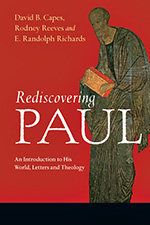

E. Randolph Richards
and
Brandon J. O'Brien

www.IVPress.com/books
InterVarsity Press
P.O. Box 1400
Downers Grove, IL 60515-1426
World Wide Web: www.ivpress.com
E-mail:
2013 by E. Randolph Richards and Brandon J. O'Brien
All rights reserved. No part of this book may be reproduced in any form without written permission from InterVarsity Press.
InterVarsity Press is the book-publishing division of InterVarsity Christian Fellowship/USA, a movement of students and faculty active on campus at hundreds of universities, colleges and schools of nursing in the United States of America, and a member movement of the International Fellowship of Evangelical Students. For information about local and regional activities, write Public Relations Dept. InterVarsity Christian Fellowship/USA, 6400 Schroeder Rd., P.O. Box 7895, Madison, WI 53707-7895, or visit the IVCF website at www.intervarsity.org.
All Scripture quotations, unless otherwise indicated, are taken from the Holy Bible, New International Version NIV Copyright 1973, 1978, 1984, 2011 by Biblica, Inc. Used by permission of Zondervan Publishing House. All rights reserved worldwide.
While all stories in this book are true, some names and identifying information in this book have been changed to protect the privacy of the individuals involved.
Cover design: Cindy Kiple
Interior design: Beth Hagenberg
Images: young man: Alexander Ryabov/Getty Images
open Bible: Soren Pilman/iStockphoto
globe: DNY59/iStockphoto
ISBN 978-0-8308-6347-1
For our sons:
Josh Richards
Jacob Richards
and
James David OBrien
About the Authors

E. Randolph Richards (M.Div. and Ph.D., Southwestern Baptist Theological Seminary) is dean of the School of Ministry and professor of biblical studies at Palm Beach Atlantic University in West Palm Beach, Florida.
He has frequently served as an interim or "supply" pastor, and from 1988 to 1996 he was a missionary with the International Mission Board, SBC, stationed in East Indonesia. His scholarly articles have appeared in Journal of the Evangelical Theological Society, Southwestern Journal of Theology, Bulletin for Biblical Research and Biblical Illustrator. He is coauthor of Discovering Paul: An Introduction to His World, Letters and Theology and The Story of Israel: A Biblical Theology. He is the author of Paul and First-Century Letter Writing and The Secretary in the Letters of Paul in the Wissenschaftliche Untersuchungen zum Neuen Testament series.
 | Rediscovering Paul: An Introduction to His World, Letters and Theology, ISBN: 978-0-8308-6798-1 |
For some of us, the apostle Paul is like a distant uncle. We've heard he's pretty important. We've read the good parts of his letters. But sometimes he comes across as prickly and unpredictable. Not someone you'd like to hang out with at a coffee shop. He'd raise his voice, try to convert the barista, and we'd want to slink out the back door. For a mid-afternoon latte, we'd prefer Jesus over Paul.
But actually, this is the guy who, from Ephesus to Athens, was the talk of the marketplace and the raconteur of the Parthenon. Maybe it's time to give Paul a break, let go of some stereotypes and try to get to know him on his own terms. If that's where you are, Rediscovering Paul is your guide. This is a book that helps us find Paul againholding forth in the marketplace of Corinth, working with a secretary in framing his letter to the Romans, or pastoring the messy emerging churches of Philippi and Thessalonica.
Drawing on the best of contemporary scholarship, honed by teaching and conversing with today's students, Rediscovering Paul is a textbook that rises above the rest.

Brandon J. O'Brien (M.A., Wheaton College Graduate School) is a part-time instructor of religion at the College of DuPage and editor-at-large for Leadership journal with Christianity Today. He is scheduled to complete his doctoral work in theological studies in 2012. O'Brien has previously published The Strategically Small Church (Bethany House, 2010).
PART ONE
Above the Surface
I (Randy) was recently in Scotland to visit an American friend who teaches there. A British New Testament scholar was driving the car and telling a story. Even from the back seat, I could see she was still quite flustered and embarrassed about what had happened. She explained that a Baptist pastor and his wife had been visiting from Georgia. As their hosting professor, she had picked them up at the airport. The pastors wife was going to ride in the back seat so that her husband could ride up front.
My British friend then stopped the story and exclaimed, The wife opened the door, said the F-word and sat down in the seat!
I looked wide-eyed at my North American colleague. He started laughing. You know what the F-word is, dont you?
Pastoral ministry has changed, but I still couldnt imagine a scenario in which a pastors wife would say such a thing. I was appalled. Our British friend was aghast. My friend continued laughing and said, She means fanny .
Our British colleague in the front seat grimaced. Yes. The woman said, Im just going to park myoh, that wordright here on the seat. My British friend couldnt even bring herself to say that word, since in British usage, fanny is impolite slang for female genitalia. (Our apologies to British readers.)
This story illustrates at least two cultural differences that well discuss in the chapters that follow. One is language. Language is perhaps the most obvious difference between cultures. Its the tip of the iceberg, the part of worldview that is clearly visible. Whether we are traveling from the United States to France or from Germany to the Philippines, we are well aware of the fact that one language is spoken in our home country, while another language is spoken elsewhere. That is to say, language differences come as no surprise to travelers. Granted, language differences may be more surprising if one travels between countries that share a language (such as the United States and Scotland). We use the word fanny in the U.S., but we use it quite differently than our British friends do. Even so, it is easy enoughonce warnedto expect differences of this sort. We discuss language in chapter three.
This story also touches on another source of cultural differences. Mores are the social conventions that dictate which behaviors are considered appropriate or inappropriate. For example, profanity exists emotionally only in ones mother tongue. When we learn a new language, we have to learn the naughty words so we dont accidentally say them and offend our hosts. To us, though, it is just a list. Native speakers may blanch and have a difficult time telling us the words; even spelling the words may rattle them. Missionaries have to be careful or they can easily develop foul mouths. The fact that we know what fanny means in British English but are not bothered by writing it just goes to show that the word itself is neutral. After all, in North America, Fanny can even be a womans first name! It is culture that supplies the connotations of a word. This raises an important question. Paul said to avoid obscenity (Eph 5:4). But who defines obscenity? We address that issue in chapter one. Then well take on the touchy topic of ethnicity in chapter two.
Next page












